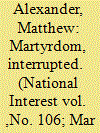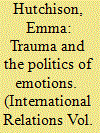| Srl | Item |
| 1 |
ID:
093702


|
|
|
|
|
| Publication |
2010.
|
| Summary/Abstract |
THE SEVEN-year manhunt came down to this. In the wee morning hours of a September dawn, Noordin Mohammed Top, the most wanted terrorist in Southeast Asia, huddled in a burning house in central Java along with three of his men. The fire started when a round shot by police in the initial standoff ignited the fuel tank of a motorcycle inside the courtyard of the house, forcing Top to seek refuge in the bathroom, where he decided to make his final stand. Top believed that dying during what he considered to be legitimate jihad would earn him a seat in heaven, and taking a few apostate policemen with him would ensure a bonus reward in the afterlife. The Indonesian police had come close to catching Top before, but he proved to be an elusive, and lethal, fugitive. Perhaps this would be their moment of glory.
|
|
|
|
|
|
|
|
|
|
|
|
|
|
|
|
| 2 |
ID:
095985


|
|
|
|
|
| Publication |
2010.
|
| Summary/Abstract |
This essay examines how traumatic events can influence the constitution of community in international relations. Trauma is often perceived as isolating individuals and fragmenting communities. This essay argues, in contrast, that practices of representation can make traumatic events meaningful in ways that give them a collective and often international dimension. Central to this process is the role played by emotions. Often neglected in scholarly analysis of international relations, emotions play a crucial political role during times of crisis and can become pivotal sites for the renewal of political stability and social control. The essay illustrates the ensuing dynamics by examining media portrayals of the Bali bombing of 12 October 2002. Focusing on photographs and the stories that accompany them, the essay shows how representations of trauma can provide a sense of collective feeling that is capable of underpinning political community. It concludes by suggesting that international relations scholars can learn much about the politics of community and security by examining prominent representations of trauma and the emotional discourses they mobilise.
|
|
|
|
|
|
|
|
|
|
|
|
|
|
|
|